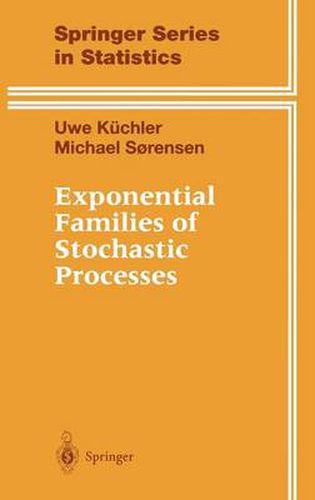Readings Newsletter
Become a Readings Member to make your shopping experience even easier.
Sign in or sign up for free!
You’re not far away from qualifying for FREE standard shipping within Australia
You’ve qualified for FREE standard shipping within Australia
The cart is loading…






This title is printed to order. This book may have been self-published. If so, we cannot guarantee the quality of the content. In the main most books will have gone through the editing process however some may not. We therefore suggest that you be aware of this before ordering this book. If in doubt check either the author or publisher’s details as we are unable to accept any returns unless they are faulty. Please contact us if you have any questions.
This is author-approved bcc: This book provides a comprehensive account of the statistical theory of exponential families of stochastic processes. The book reviews the progress in the field made over the last ten years or so by the authors, two of the leading experts in the field, and several other researchers. The theory is applied to a broad spectrum of examples. A large number of frequently applied stochastic process models with discrete as well as with continuous time are covered by the theory developed in the book. The exponential families of stochastic processes are the most tractable type of statistical models for stochastic processes. On the other hand, they include models that are complex enough to exhibit basic inference problems that are peculiar to stochastic process models. Therefore they are a good starting point for the statistican who plans to work in this interesting and vigorous field. To make the reading easier for statisticians with only a basic background in the theory of stochastic process, the first part of the book is based on classical theory of stochastic processes only, while stochastic calculus is used late in the book. Most of the concepts and tools from stochastic calculus that a statistician is likely to need, when working with inference for stochastic processes, are introduced and explained without proof in an appendix. The appendix can also be used independently as an introduction to stochastic calculus for statisticians. The statistical concepts are explained carefully so that probabilists with only a basic background in statistics can use the book to get into statistical inference for stochastic processes. Exercises are included to make the book useful for an advanced
$9.00 standard shipping within Australia
FREE standard shipping within Australia for orders over $100.00
Express & International shipping calculated at checkout
This title is printed to order. This book may have been self-published. If so, we cannot guarantee the quality of the content. In the main most books will have gone through the editing process however some may not. We therefore suggest that you be aware of this before ordering this book. If in doubt check either the author or publisher’s details as we are unable to accept any returns unless they are faulty. Please contact us if you have any questions.
This is author-approved bcc: This book provides a comprehensive account of the statistical theory of exponential families of stochastic processes. The book reviews the progress in the field made over the last ten years or so by the authors, two of the leading experts in the field, and several other researchers. The theory is applied to a broad spectrum of examples. A large number of frequently applied stochastic process models with discrete as well as with continuous time are covered by the theory developed in the book. The exponential families of stochastic processes are the most tractable type of statistical models for stochastic processes. On the other hand, they include models that are complex enough to exhibit basic inference problems that are peculiar to stochastic process models. Therefore they are a good starting point for the statistican who plans to work in this interesting and vigorous field. To make the reading easier for statisticians with only a basic background in the theory of stochastic process, the first part of the book is based on classical theory of stochastic processes only, while stochastic calculus is used late in the book. Most of the concepts and tools from stochastic calculus that a statistician is likely to need, when working with inference for stochastic processes, are introduced and explained without proof in an appendix. The appendix can also be used independently as an introduction to stochastic calculus for statisticians. The statistical concepts are explained carefully so that probabilists with only a basic background in statistics can use the book to get into statistical inference for stochastic processes. Exercises are included to make the book useful for an advanced